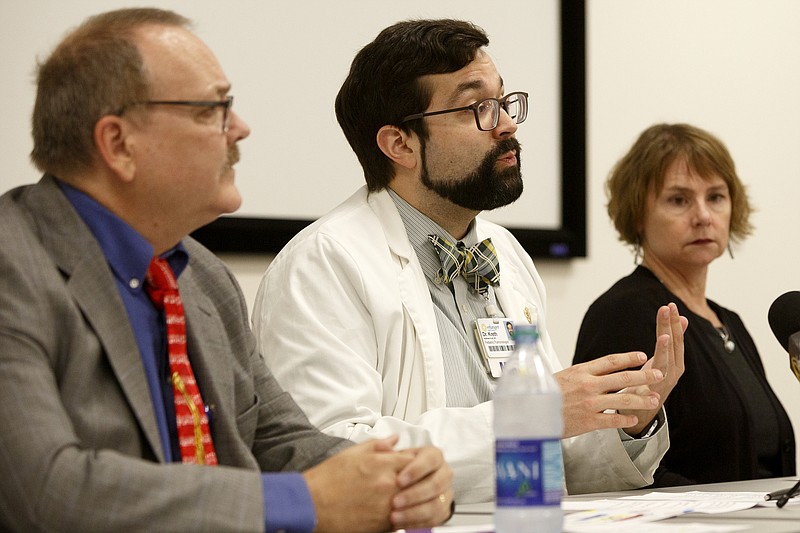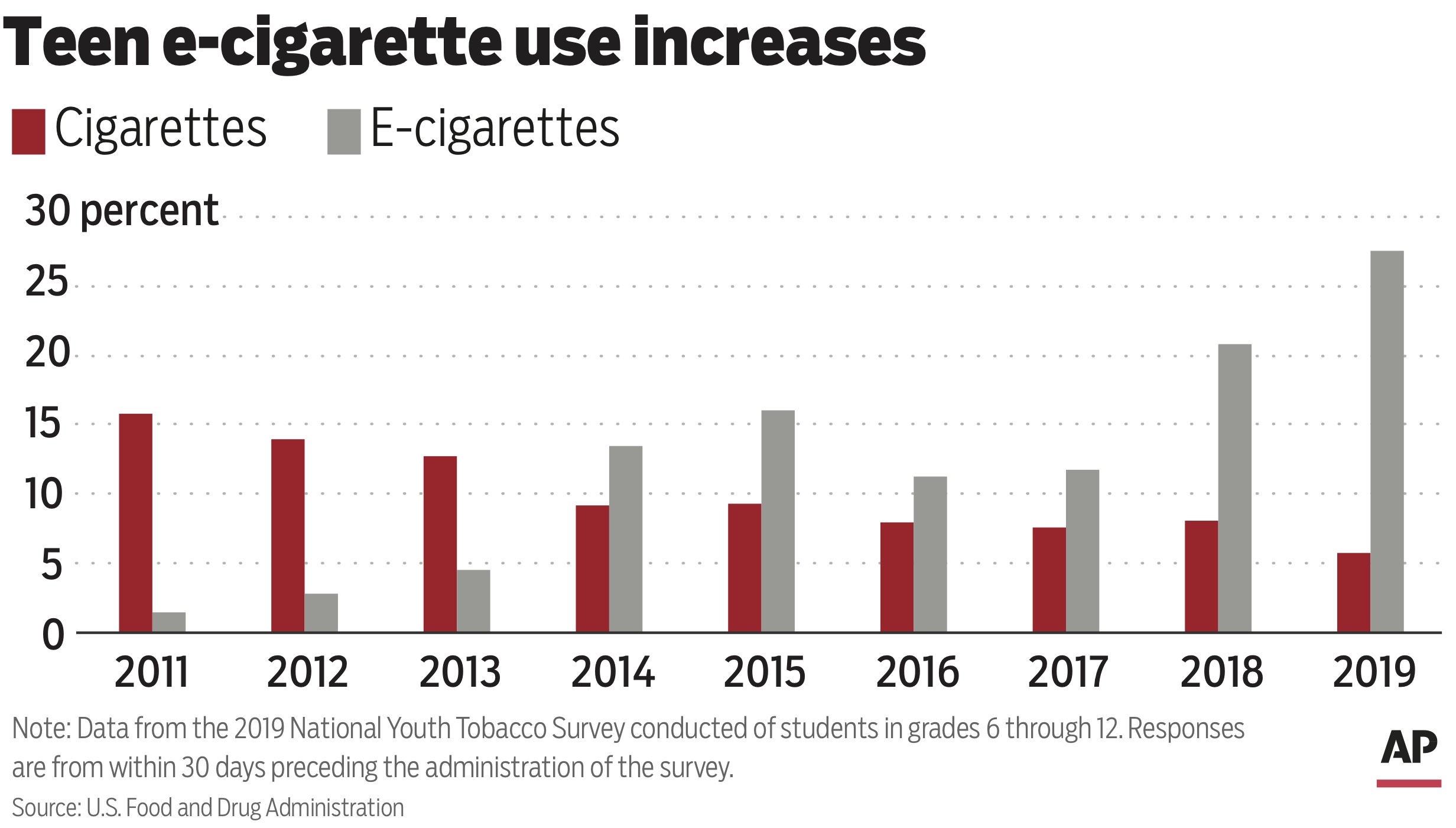A new youth cessation clinic at the Children's Hospital at Erlanger aims to address electronic cigarette use in patients under age 21 as health officials investigate a mysterious, multistate outbreak of severe lung injury linked to vaping.
Dr. Matthew Kreth, a pediatric pulmonologist at Erlanger, said a surge in youth e-cigarette use, commonly called vaping, prompted the idea to start the clinic. Kreth said a few patients have already been seen.
"The last National Youth Tobacco Survey had 3.6 million middle or high school students use a vape product in the last 30 days, so it's kind of exploded," Kreth said. "We were going to do it from an addiction standpoint and just the amount of middle and high school students that are [vaping], and now you have more of a crisis because of the respiratory failure associated with it."
Concerned parents may schedule appointments for their children by calling 423-778-KIDS (5437) and asking for the "Smoke B Gone" clinic. Pediatrician referrals to the clinic also are accepted, officials said.
So far, 805 lung injury cases have been reported nationally with about 40 cases in Tennessee, according to Kreth. Nearly 80% of those cases have occurred in people age 34 and younger, including 16% under age 18, according to the U.S. Centers for Disease Control and Prevention's latest report. Of those sickened, 12 resulted in death - including one death in Georgia - and 69% of the cases were males.
E-cigarettes work by heating a liquid to produce an aerosol that users inhale into their lungs. That liquid can contain nicotine, cannabinoid (CBD) oils, tetrahydrocannabinol (THC) - the mind-altering compound in marijuana that produces a "high" - and other substances or additives.
All reported cases of the recent lung illness are in patients with a history of vaping, and most but not all related lung injuries have been linked to marijuana products. However, the specific chemical causing the illness remains a mystery as do the long-term effects.
Paula Collier, health promotion program manager at the Chattanooga-Hamilton County Health Department, said Wednesday at a news conference to discuss the outbreak that e-cigarettes contain small particles that our bodies are not meant to breathe. Those particles can include heavy metals, such as nickel and lead, volatile organic compounds and other chemicals, as well as nicotine, which is highly addictive.
"Anyone who is using vaping products is taking a risk," Collier said. "They have been marketed as safer just because they don't have carbon monoxide, which is a product of burning that you find in a combustible cigarette. But there are a lot of chemicals, and they're not safe to be inhaled."
The Children's Hospital at Erlanger has treated one patient who was admitted to the emergency department for acute respiratory failure - unable to breathe - due to e-cigarette use. That patient improved after steroid treatment, but as with many of those sickened, the cause was a combination of nicotine and THC e-cigarette use, Kreth said.
"Three fourths of these cases have been use of not just vaping but also vaping the THC oils," he said. "When that happens, it causes hyperinflammatory response in the lungs. The lungs basically start attacking those microfine particles everywhere, you get a hyper immune response to that, which leads to respiratory failure."
The cases require high flow oxygen or intubation and a ventilator with a breathing tube to aid in breathing, Kreth said.
Dr. John Heise, an adolescent medicine physician at Erlanger Children's, said youth participating in risky behaviors, such as cigarette or alcohol consumption, isn't new. But what is unique about e-cigarettes is how fast they've grown in popularity.
Locally, Heise said, doctors began noticing a surge in e-cigarette use among middle schoolers about two years ago that has now spread throughout high school and college.
What's especially troubling about youth initiation is that nicotine and other addictive substances affect youth differently, because the brain is still maturing until the age of 25, he said.
"The studies do show that regular use of vaping and cigarettes does affect their memory or concentration, their impulse control, their learning ability and it seems to be affecting their synapses and their developing brain," Heise said.
Although marijuana and other products containing psychoactive THC are not legal in Tennessee, Heise said that, depending on the week, about a third to half of the local students he sees vaping are also incorporating THC oil.
"And that's admitting to it," he said. "So it is very easy to get, and that hasn't changed. It's getting probably even easier to get compared to a year ago."
The oil can be purchased from companies legally in states that allow marijuana sales, but also can be added and sold illegally through third parties. These products are not regulated by the FDA, so it's impossible to know what's in them.
Signs of youth e-cigarette use are similar to other high-risk behaviors and can include changes in behavior, changes in friends, acting secretive, asking for more money and stealing products from older family members.
"It's pretty easy to get these products, but it does take some money," Heise said.
And as far as parents asking their kids to stop vaping, Heise said creating a hostile situation decreases their chance of success.
"With high-risk behaviors with adolescents, we know that sometimes they're ready, sometimes they aren't. Sometimes they just have to be exposed to other peers, to other media," he said. "Every teenager is a little different when they're ready, but we know that the more frequency of appearances and knowledge, they're more likely to take that step."
Contact Elizabeth Fite at efite@timesfreepress.com or 423-757-6673.


